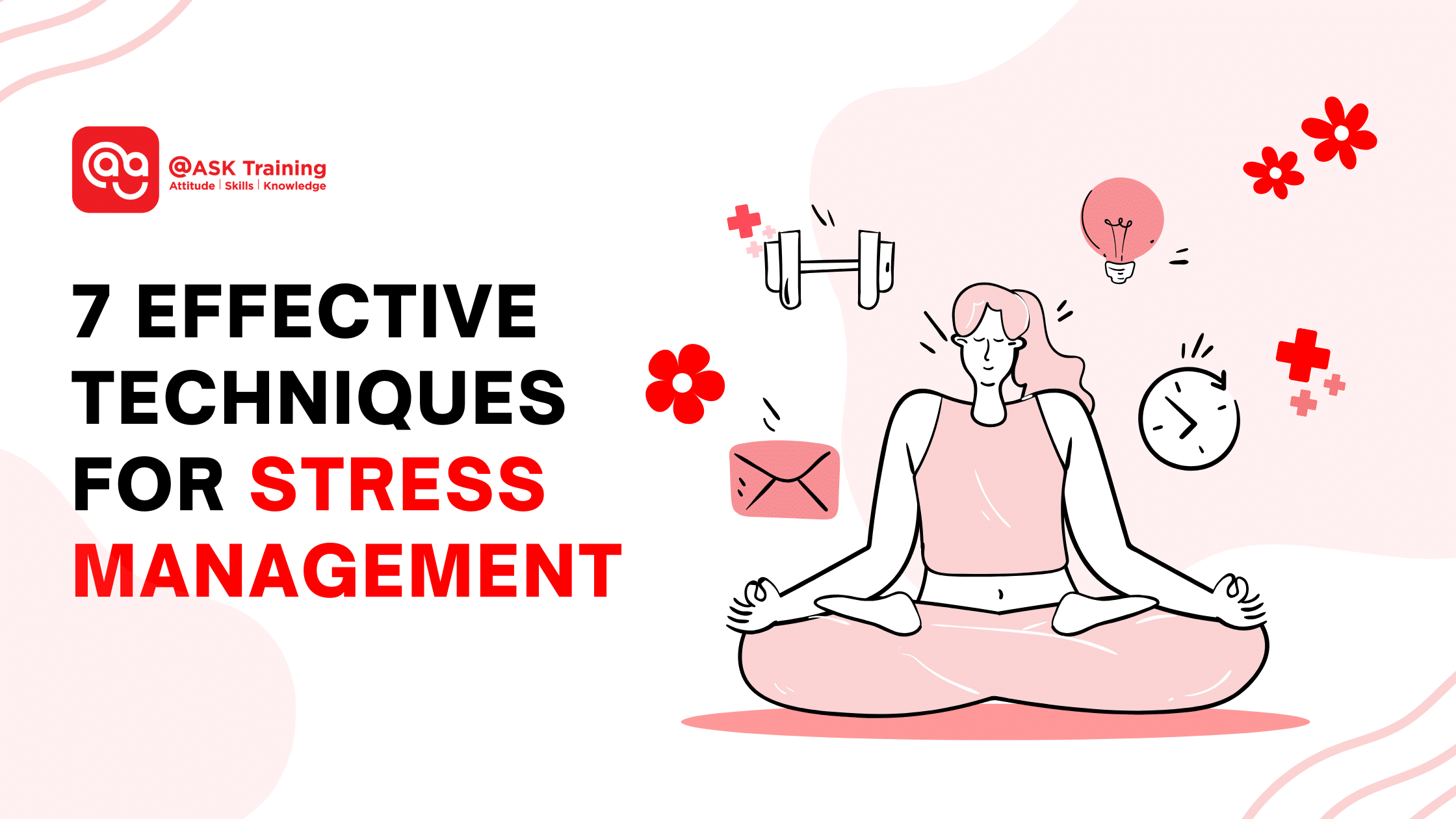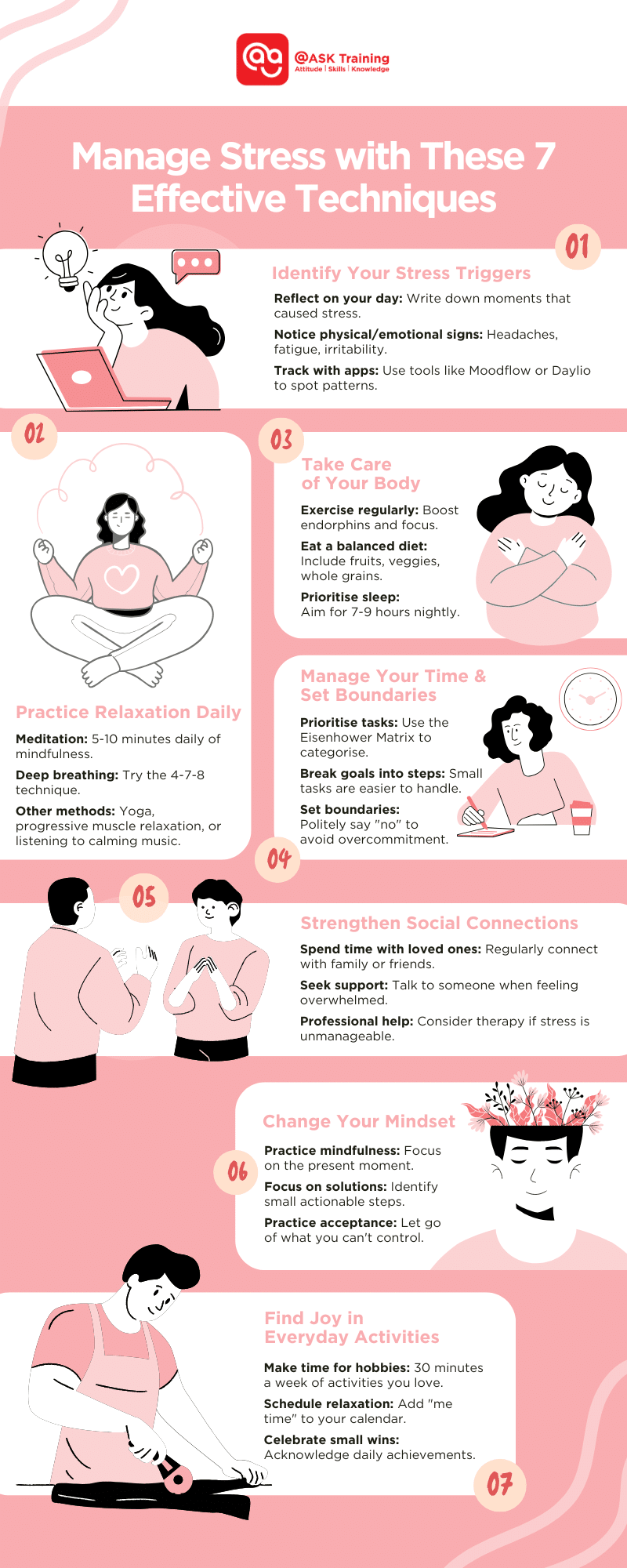
Stress is an inevitable part of life, but how we manage it can make all the difference.
In Singapore, stress levels are particularly high—as of 2023, nearly nine in ten Singaporeans (87%) reported feeling stressed, a figure significantly higher than the global average. What’s more, about 16% of these individuals said their stress was unmanageable, highlighting the urgent need for effective stress reduction strategies.
Whether you’re juggling work deadlines, family responsibilities, or the pressures of college life, chronic stress can take a toll on your physical and mental health.
The good news? With the right stress relief techniques, you can reduce stress and reclaim your sense of balance.
In this article, we’ll explore seven actionable stress management tips to help you navigate life’s challenges with greater ease. From identifying your stress triggers to finding joy in everyday activities, these techniques are designed to empower you to take control of your well-being.
Let’s begin!
1. Identify Your Stress Triggers
The first step in how to reduce stress is understanding what causes it. Stress triggers can vary widely—whether it’s a demanding job, financial worries, academic pressure, or even certain habits like procrastination.
How to Start:
- Reflect on your day: At the end of each day, take 5 minutes to jot down moments when you felt stressed. Was it during a meeting? While scrolling through social media? Or when you were running late?
- Notice physical and emotional signs: Stress often shows up in your body (headaches, fatigue, muscle tension) or emotions (irritability, anxiety, feeling overwhelmed).
Actionable Tips:
- Keep a stress journal: Use a notebook or an app like Moodflow or Penzu to track your stress patterns. Write down the situation, how you felt, and how you responded. Over time, you’ll start to see trends.
- Use mood-tracking apps: Apps like Daylio can help you monitor your emotional state and identify stress triggers.
Example:
If you notice that checking your work email before bed leaves you feeling anxious, try setting a boundary to stop checking emails after 8 PM.
By recognising what sets off your stress, you can take proactive steps to address it.
2. Take Care of Your Body
Your physical health plays a crucial role in managing stress effectively. A healthy body supports a resilient mind.
Exercise Regularly
- Why it works: Physical activity releases endorphins, the body’s natural stress relievers. It also helps clear your mind and improve focus.
- How to start: You don’t need a gym membership—try a 20-minute home workout, go for a walk, or dance to your favourite music.
Eat a Balanced Diet
- Why it matters: Nutrient-rich foods like fruits, vegetables, and whole grains help stabilise your mood and energy levels.
- How to start: Plan your meals ahead of time to avoid stress-eating unhealthy snacks.
Prioritise Sleep
Aim for 7-9 hours of quality sleep each night to recharge your mind and body.
- Why it’s important: Quality sleep helps your body recover and builds mental resilience.
- How to start: Create a bedtime routine—turn off screens an hour before bed, read a book, or practise relaxation techniques.
- Apps to try: Calm or Headspace for sleep meditations, or Sleep Cycle to track and improve your sleep patterns.
When you feel good physically, you’re better equipped to tackle life’s challenges.
3. Practise Relaxation Daily
Relaxation methods are powerful tools for reducing stress and improving focus.
Meditation
- Why it works: Meditation helps you stay present and reduces the mental clutter that contributes to stress.
- How to start: Spend 5-10 minutes daily focusing on your breath or practicing mindfulness.
Deep Breathing
- Why it works: Deep breathing activates your parasympathetic nervous system, which helps calm your body.
- How to start: Try the 4-7-8 technique—inhale for 4 seconds, hold for 7 seconds, and exhale for 8 seconds.
Other Calming Methods
- Yoga: Combines physical movement with mindfulness.
- Progressive Muscle Relaxation: Tense and release each muscle group to relieve physical tension.
- Listening to Music: Create a playlist of calming songs or nature sounds to unwind.
Make relaxation a non-negotiable part of your routine to keep stress at bay.
4. Manage Your Time and Set Boundaries
Feeling overwhelmed often stems from poor time management or overcommitting.
Prioritise Tasks
- Why it works: Focusing on what’s urgent and important helps you avoid last-minute stress.
- How to start: Use the Eisenhower Matrix to categorise tasks into four quadrants: urgent/important, not urgent/important, urgent/not important, and not urgent/not important.
Break Goals into Steps
- Why it works: Large projects feel less daunting when divided into smaller, manageable tasks.
- How to start: Break down a big goal into actionable steps. For example, if you’re writing a report, start with an outline, then tackle one section at a time.
Set Boundaries
- Why it’s important: Saying no to unnecessary commitments protects your time and energy.
- How to start: Practise saying no politely but firmly. For example, “I’d love to help, but I’m already committed to other projects.”
By organising your time and setting clear boundaries, you’ll reduce stress and increase productivity.
5. Strengthen Your Social Connections
Strong relationships are a buffer against stress.
Spend Time with Loved Ones
- Why it works: Social support provides comfort, perspective, and practical advice.
- How to start: Schedule regular catch-ups with friends or family, even if it’s just a quick video call.
Seek Support
- Why it’s important: Talking about your stress can help you feel less alone.
- How to start: Reach out to a trusted friend, family member, or mentor when you’re feeling overwhelmed.
Professional Help
- When to consider it: If stress feels unmanageable or is affecting your daily life, therapy or counseling can be a valuable resource. Check your local mental health services to find what’s best for you.
A supportive network can provide comfort, perspective, and practical advice.
6. Change Your Mindset to Reduce Stress
Your mindset plays a significant role in how you experience stress.
Practise Mindfulness
- Why it works: Staying present helps you avoid dwelling on past regrets or future worries.
- How to start: Spend a few minutes each day focusing on your breath or observing your surroundings without judgment.
Focus on Solutions
- Why it works: Shifting your energy toward actionable steps helps you feel more in control.
- How to start: Instead of fixating on a problem, ask yourself, “What’s one small step I can take to improve this situation?”
Practise Acceptance
- Why it’s important: Letting go of things beyond your control reduces unnecessary stress.
- How to start: Remind yourself that it’s okay not to have all the answers. Focus on what you can influence.
A positive outlook can transform how you handle stress.
7. Find Joy in Everyday Activities
Incorporating moments of joy into your day is essential for emotional balance.
Make Time for Hobbies
- Why it works: Engaging in activities you love boosts your mood and provides a mental break from stress.
- How to start: Dedicate at least 30 minutes a week to a hobby, whether it’s painting, gardening, or playing an instrument.
Schedule Relaxation
- Why it’s important: Blocking out time for relaxation ensures you recharge regularly.
- How to start: Add “me time” to your calendar, whether it’s reading a book, taking a bath, or going for a walk.
Celebrate Small Wins
- Why it works: Acknowledging your achievements, no matter how small, boosts your confidence and reduces stress.
- How to start: At the end of each day, write down one thing you accomplished or are grateful for.
These moments of happiness act as a natural stress reliever.
Wrapping Up
Managing stress doesn’t have to be overwhelming. By implementing these seven stress management tips, you can reduce stress and improve your overall well-being.
Start small by choosing one or two strategies to incorporate into your daily life. Remember, stress management is a journey, not a destination.
Take charge of your mental health today and enjoy a more balanced, fulfilling life.
Don’t Let Stress Hold You Back
If you’re looking to upskill and learn new techniques to enhance aspects of your personal life, check out @ASK Training’s range of Personal Development courses. Gain deeper insights and practical skills to support your personal growth and well-being.
Our Managing Stress and Achieving Wellness is specifically designed to help you build resilience and lead a more balanced life.
Explore our courses today and take the first step toward a healthier, happier you!
Related Courses
- Managing Stress and Achieving Wellness
- Effective Relaxation Techniques
- Stop Burning-Out and Start Settling with Passion (Job Burn-Out)
◆◆◆

